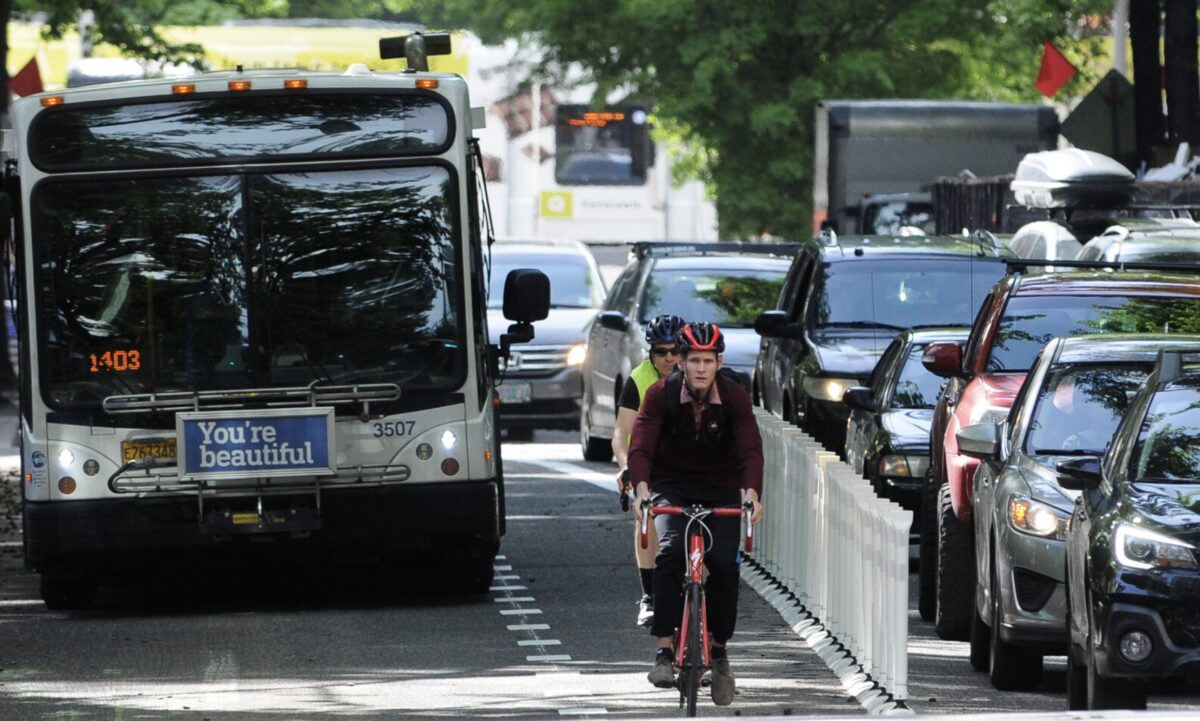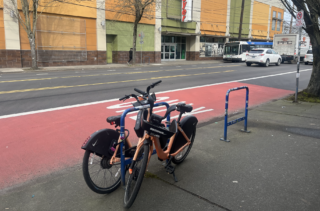
The average gas price in the Portland region right now is about $4.70, and that number isn’t likely to come down anytime soon. That means we’re in a new reality when it comes to transportation choices if we assume that cost is a big factor in the daily decision of how we get around.
“Historically we have seen a rise in cycling and transit ridership when gas prices have gone up.”
— Hannah Schafer, PBOT
According to Hannah Schafer, interim communications director for the Portland Bureau of Transportation, the gas price spike will result in more people contemplating a low-car lifestyle.
“Historically we have seen a rise in cycling and transit ridership when gas prices have gone up (a recent example would be the worldwide economic collapse in 2008-9), but not since we’ve had bike share in Portland,” she told me in an email this week. “It’s too soon to say with the data we have currently, but it is probably safe to assume that some people will switch to bike share, e-scooters, or transit while gas prices are up.”
PBOT data shows that Biketown and e-scooter rentals have already both more than doubled from this time last year. From January 1 – February 28, 2021, there were 21,032 rides on the Biketown system. During the same period this year, there were 44,578 rides — a 112% increase! E-scooters were rented 42,739 times last year from January 1 – February 28, and this year that number has jumped to almost 90,000.
Schafer points out it’s unclear if that data was influenced by increased gas prices, but it’s not a far-fetched idea.
Advertisement

(Photo: Taylor Griggs/BikePortland)
If we assume cost is one of the main drivers of mode choice, let’s do the math to see how bike share and transit stack up against driving.
Someone who takes a seven-mile (each way), 30-minute ride once per day could expect to pay about $33 a week if they bought a Biketown membership.
A TriMet monthly pass for an adult is $100, or $91 if you buy an annual pass. If you took TriMet twice daily you’d spend $25 a week.
What about driving a car? (I was very generous with the miles per gallon averages. It’s also difficult to include how much extra gas you’d waste idling in traffic, so keep in mind these are low-range estimates.)
— If you drive a Prius, which averages about 55 mpg, a 14-mile trip probably costs you about $6 a week. This is substantially less than both the Biketown and TriMet fees – but I’ll get to some other thoughts on that below.
— If you drive a Kia Sportage that got 25 mpg, you could expect to pay about $13 a week for a 14-mile trip.
— And on the very low end of the spectrum, let’s say you drove a Ram 1500 TRX, which gets – at most – 12 miles per gallon. If you were using this for a 14-mile trip, you could expect to pay about $27 a week, so a Biketown membership would be about even.
To summarize, unless you’re driving the least fuel efficient car on the market, gas prices still haven’t gotten high enough to make it cheaper to commute solely by Biketown e-bike. (This is why we should consider more subsidies.)
However, let’s take a look at the savings you’d have if you used TriMet. This is a more feasible option for someone living in the suburbs and commuting to Portland every day, because Biketown doesn’t extend past the city limits. If you live in Hillsboro and work at OHSU, you have a 40-mile commute every day. In a car that gets 25 mpg, you’re spending $38 a week, as opposed to the $25 taking the MAX would cost. And if you travel during rush-hour, transit times might be comparable to driving.
More dramatically, let’s say you have a 30-mile commute each way, from Hillsboro to Portland International Airport. At 25 mpg, you’ll be spending about $57 a week. During a low traffic period, you could anticipate being on public transit for about a half hour longer than you’d be in a car.
(Keep in mind in these situations, your after-work public transit use would be free. So if you like to hang out in Portland on the weekends, you wouldn’t have to pay an extra dime to get there from the suburbs.)
Advertisement
Now, what if you work from home and just use your car for errands? I’ll use myself as an example. I don’t have a Biketown membership, and I often get charged the extra $1 if I don’t find a designated bike parking spot (sorry, Biketown people), so there are definitely ways I could be saving money.
For the past month, I’ve been completely carfree. I’ve traveled about 25 miles on Biketown and paid $40. It was helpful to use alongside TriMet, which I spent $10 on last month. The rest of the time I rode my own (non-electric) bike or walked. At the time I drove the absolute most, let’s say I was taking my car out for 15 miles a day at 25 mpg, that would have been $80 a month compared to the $50 I spent this month.
Just the act of not having a car as an option has limited the amount of traveling I do, and I plan out trips in advance to make sure I’m making the most out of my time. I would’ve been doing this regardless of how much gas costs, but it’s a nice bonus to be able to stand on the sidelines during all this fervor around fuel finances.
Of course there are many other reasons why someone might not choose Biketown or TriMet over driving. Personal security, poor bike infrastructure in some parts of town, and lack of transit access and service are among the barriers. And even if your Biketown commute would be more expensive than driving, there are other reasons to want to do it than to save money — the joy of getting outside, not having to sit in traffic and wanting to minimize your carbon output are just some examples.
This is not even to mention the other financial burdens that cars can saddle people with. The camel was already carrying the costs of parking, maintenance, insurance, registration and payments, but these gas prices could be the straw on its back.
Plus, there are ways to qualify for reduced fares on TriMet or Biketown that the gas station isn’t going to offer you.
What do you think? Are skyrocketing gas prices enough to get you to try a different form of transportation? How do you think the City of Portland and transportation reform activists can best seize this pivotal moment to try to shift our transportation landscape?


